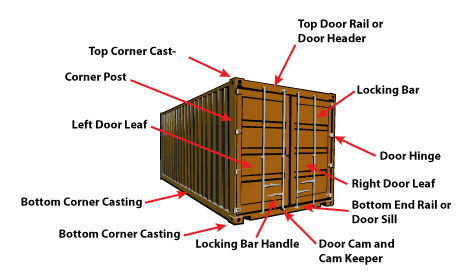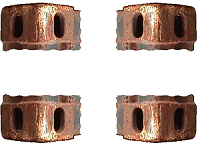A container user should be aware of the most
important structural differences between containers. Users are
responsible for making the appropriate preparations for
packing and securing cargo. Exterior markings provide container
loading capacity.
We will describe the fundamental components and design of standard box containers.
Basic Container Frame
The load-carrying element of all box containers is a steel
framework, consisting of four corner posts and two bottom side
rails, two top side rails, two bottom cross members, a front top
end rail and a door header.
Bottom Cross Members
Bottom cross members serve as supports for the container floor.
Additional bottom cross members are fitted between the bottom
side rails, to serve as supports for the floor covering.
Side and End Walls
The side and end walls are the components of a
standard box container which are capable of bearing the least
load. Most walls are constructed of 12-16 gauge steel.
Roof Panel
Roof panels are normally constructed of the same materials used for the walls
and are designed to prevent water from pooling on the
top of the container. When containers
are stacked, the load is placed on the corner posts and a
reinforced panel located at each corner, not on the roof
panel.
While the roof panel will normally support several hundred
pounds, WALKING ON THE ROOF PANEL IS NOT RECCOMMENDED. Load bearing
capacity varies by container construction, age and condition.
Essential Container Components
The following figure illustrates the essential components
of standard box containers. Additional components include the
door bar handles and the locking components required for sealing.

Standardization of container components and dimensions
allows for the use of standard handling equipment and
transportation. The majority of
containers used for maritime transport are constructed according to
ISO standards. ISO corner castings are a key component.
| ISO Corner
Castings |
 |
|

